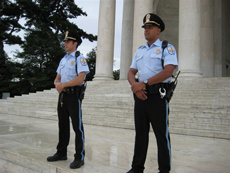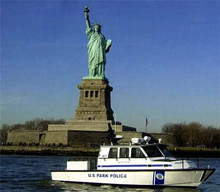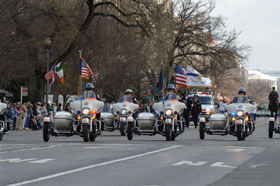
United States Park Police (USPP) Officers protect life and property, investigate
crimes, enforce Federal law and assimilate State law, affect arrests, testify
in federal and state Court, serve warrants, and patrol various areas including
federal highways, parks and the monuments and memorials on the National Mall
in the District of Columbia and the Statue of Liberty in New York City.
Originally, the authority of the “Park Watchmen,” as the USPP
were known, was restricted to Federal property in the District of Columbia. However,
on August 5, 1882, an Act of Congress gave the Park Watchmen concurrent jurisdiction
with the Metropolitan Police Department of the District of Columbia, as well
as the same authority and powers. The official designation was changed
to the United States Park Police in December 1919.

On August 10, 1933, Congress placed the USPP within the Department of the
Interior, National Park Service, with jurisdiction in all National Park Service
areas and certain other Federal and State lands.
In the early 1970’s, when Congress added two large urban parks to
the National Park System – Gateway National Recreation Area in New
York and New Jersey and Golden Gate National Recreation Area in the San Francisco
Bay area, the USPP were designated by the National Park Service to provide
federal law enforcement and urban police services to these areas.
- Where do Police Officers Work?
- What do Police Officers do?
- How do I become a Police Officer?
- Are there any special requirements?
- What opportunities exist for training and career advancement?
- What benefits do Police Officers earn?
1. Where do Police Officers Work?

Initial appointments are made to the Washington metropolitan area where
the USPP Headquarters and the majority of officers are assigned. Officers
may be reassigned to the USPP New York Field Office (located in the Gateway
National Recreation Area in New York City) or to the USPP San Francisco Field
Office (located in the Golden Gate National Recreation Area in San Francisco,
CA).

A contingent of USPP officers are assigned to the Federal Law Enforcement
Training Center (FLETC) located in Glynco, Georgia and serve as instructors.
Some USPP Captains, designated as Regional Law Enforcement Specialists,
are assigned to provide guidance and support to National Park Service Regional
Law Enforcement Ranger Programs in the National Capital Region (Washington,
DC), Northeast Region (Philadelphia, PA), Intermountain Region (Denver,
CO), and Pacific West Region (Oakland, CA and Seattle, WA).
In emergencies or during special events, USPP Officers may also be detailed
to provide additional law enforcement assistance in any of the over 400
sites across the nation that make up the National Park system.

2. What do Police Officers do?
The USPP provide professional federal law enforcement and urban police services
to designated areas within the National Park Service – primarily the
Washington, D.C., New York, New York and San Francisco, California metropolitan
areas.
In the Washington metropolitan area, the USPP provides primary law enforcement
and protection at the Washington Monument, National Mall, Lincoln Memorial,
Jefferson Memorial, and other significant memorials, monuments and historic
structures. The USPP is responsible for the protection and safety
of millions of visitors to National Park Service areas of the Nation’s
Capital. USPP officers frequently provide protection for the President
of the United States and visiting foreign heads of state. Officers
may be requested to provide assistance to other areas of the National Park
System as well as other law enforcement agencies during emergencies. Due
to the many demonstrations, First Amendment protests, and large celebrations
held on National Park Service areas of the Nation’s Capital, the
USPP is recognized for its ability to manage high profile demonstrations
and large special events. The USPP has primary patrol responsibility
on five federal parkways leading into and out of downtown Washington, DC
as well as large urban parklands located throughout the city and the surrounding
suburbs.
The New York Field Office is responsible for providing
law enforcement and protection services at the Brooklyn, Queens, and Staten
Island Units of Gateway National Recreation Area (GNRA) as well as at the
Statue of Liberty / Ellis Island National Historic Site. Headquartered
on Floyd Bennett Field in Brooklyn, New York, the USPP has served at GNRA
since its inception in 1974.

Fort Wadsworth National Historic Site on Staten Island became part of
GNRA in 1994. The site also houses several Military and DOD agencies. There
is a large military housing area that is jointly patrolled by the USPP
and the U.S. Coast Guard. In 1995, the USPP assumed the responsibility
for providing law enforcement services to the Statue of Liberty and Ellis
Island National Historic Sites and the millions of tourists that visit
these sites each year. Patrol Operations are divided with the Brooklyn-Queens
District located on Floyd Bennett Field in Brooklyn and the Staten Island-Manhattan
District office in Fort Wadsworth. There are Stations in Brooklyn, Staten
Island, and Ellis Island. Riis Park in Rockaway, Queens and Great
Kills Park in Staten Island are two heavily visited major beaches located
within GNRA.
The San Francisco Field Office provides full law enforcement services to
the Golden Gate National Recreation Area, Fort Mason, and the Presidio, a
former military base. The Presidio functions as a city within the city
of San Francisco. Officers patrol National Park Service land at the
base of the Golden Gate Bridge, the Marin Headlands, Stinson Beach, Muir
Woods, Fort Funston, Ocean Beach, and Aquatic Park, adjacent to Fisherman’s
Wharf.

3. How do I become a Police Officer?

USPP
Officer positions are advertised by the Office of Personnel Management
on USAJobs. Applicants must complete and pass a competitive
written examination, an oral interview, a medical examination and psychological
evaluation, and a battery of physical fitness and agility tests. After
selection, USPP recruits must successfully complete the twelve-week basic
training program at FLETC in Glynco, Georgia. After graduation from the basic law enforcement
program, recruits receive four-weeks of specialized training and twelve-weeks
of field training under the mentoring of experienced USPP officers.

4. Are there any special requirements?
Applicants for USPP Officer positions must meet all of the following requirements:

- Hold United States citizenship
- Be at least 21 years of age and not have reached their 37th birthday
prior to appointment (Note: A waiver of the maximum entry age may
be applicable to individuals who have previous qualifying service in a
Federal civilian law enforcement position covered by the 6c retirement
system)
- Have 20/100 vision, or better, correctable to 20/20 with contact lenses
or eyeglasses
- Hold a valid driver’s license and a good driving record
- Hold a high school diploma, or equivalent
- Have two (2) years of progressively responsible experience that demonstrates
ability to learn and apply complex regulations and procedures; OR, a combination
of acceptable experience and education of at least two (2) years. When
combining education and experience, an academic year of study (30 semester
hours or 45 quarter hours) will be considered equivalent to one (1) year
of experience
- Pass a competitive written examination
- Pass a battery of physical fitness and agility tests (pre-employment
and semi-annually after hiring)
- Pass an oral interview
- Pass a medical examination (pre-employment and periodically after hiring)
- Pass a psychological evaluation
- Submit to drug testing (pre-employment and randomly after hiring)
- Submit information to initiate a background investigation through
the Office of Personnel Management and receive a favorably adjudicated critical-sensitive
suitability determination
- May not have been convicted of a misdemeanor or felony crime of domestic
violence which would preclude the carrying, possession, and use of
firearms and other weapons required by the position
- Required to wear a uniform
- Must be available to work nights, weekends, and holidays
- Required to qualify with and use firearms as part of their assigned
duties, and to maintain such qualification

5. What opportunities exist for training and career advancement?

The USPP has a wide range of specialized positions available for motivated
and skilled police officers. After meeting established eligibility requirements,
officers may compete to be selected for one of a number of specialized units
including: Motorcycle, Horse Mounted Patrol, Criminal Investigations,
Narcotics and Vice, Identification, SWAT, Canine, Firearms/Physical Fitness,
Traffic Safety, Bicycle/Dirt Bike, Aviation, and Marine Patrol.
The USPP is a paramilitary organization with a rank structure from Private/Police
Officer to Chief of Police. Eligible USPP officers have the opportunity
to compete for promotions in rank as vacancies occur and positions are
announced, up to and including Chief of Police. Supervisory, mid
level, and upper level management positions are available in all primary
geographic areas – Washington, DC, New York City, and San Francisco.

6. What benefits do Police Officers earn?
United States Park Police Officers receive a number of employee benefits
including:

- Enhanced annuity law enforcement retirement under the provisions
of 5 USC 8401: Police Officers can retire at age 50 with 20
years of covered service. Retirement is mandatory at age 57
- Prior Federal civilian or military service
may be creditable
- Overtime pay, night differential, holiday pay, and Sunday premium
pay
- Applicable geographic pay adjustment (locality pay) according
to assigned duty station
- Annual leave earned at a rate of 13 to 26 days per year, based
on length of Government service
- Sick leave earned at a rate of 13 days annually with no limit
to the amount of sick leave that can be accumulated
- Ten paid Federal holidays annually
- High quality uniforms and police equipment provided at no cost
- Workers compensation and death benefits are provided in the event of performance of duty - related injury or death
- Life, medical, health, dental, and eye care insurance programs
available at competitive prices
- Contribution to a tax deferred retirement plan that offers
up to 5% of salary in matching funds (Thrift Savings Plan)

